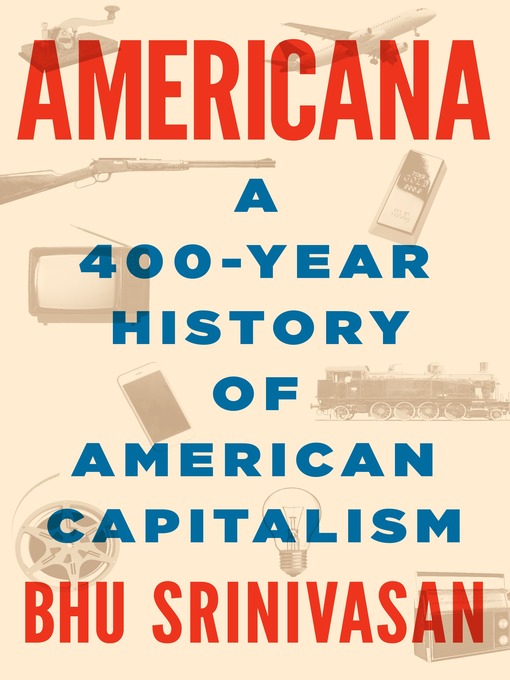NAMED A BEST BOOK OF 2017 BY THE ECONOMIST
From the days of the Mayflower and the Virginia Company, America has been a place for people to dream, invent, build, tinker, and bet the farm in pursuit of a better life. Americana takes us on a four-hundred-year journey of this spirit of innovation and ambition through a series of Next Big Things — the inventions, techniques, and industries that drove American history forward: from the telegraph, the railroad, guns, radio, and banking to flight, suburbia, and sneakers, culminating with the Internet and mobile technology at the turn of the twenty-first century. The result is a thrilling alternative history of modern America that reframes events, trends, and people we thought we knew through the prism of the value that, for better or for worse, this nation holds dearest: capitalism.
In a winning, accessible style, Bhu Srinivasan boldly takes on four centuries of American enterprise, revealing the unexpected connections that link them. We learn how Andrew Carnegie's early job as a telegraph messenger boy paved the way for his leadership of the steel empire that would make him one of the nation's richest men; how the gunmaker Remington reinvented itself in the postwar years to sell typewriters; how the inner workings of the Mafia mirrored the trend of consolidation and regulation in more traditional business; and how a 1950s infrastructure bill triggered a series of events that produced one of America's most enduring brands: KFC. Reliving the heady early days of Silicon Valley, we are reminded that the start-up is an idea as old as America itself.
Entertaining, eye-opening, and sweeping in its reach, Americana is an exhilarating new work of narrative history.
-
Creators
-
Publisher
-
Release date
September 26, 2017 -
Formats
-
OverDrive Listen audiobook
- ISBN: 9780525498599
- File size: 613565 KB
- Duration: 21:18:15
-
-
Languages
- English
-
Reviews
-
AudioFile Magazine
Author Bhu Srinivasan, founder of a media company focused on sharing U.S. economic history, reads a charming personal introduction before the resonant Scott Brick narrates the remaining 21 hours of this informative audiobook. From the Pilgrims of 1620 to Silicon Valley is a lot of ground to cover, and Brick's phrasing artistry and sensitivity to the material help the author's numerous anecdotes feel woven into the same narrative fabric. Srinivasan describes how innovations like the steamboat, the telephone, manufacturing, the stock market, and electronic banking laid the groundwork for the creative commerce and finance that typifies the U.S. economy today. An accessible history with a populist bent, this work leans more on storytelling than analysis. That approach and Scott Brick's engagement make it fun to learn how the Colonies grew to the economic giant we are today. T.W. © AudioFile 2018, Portland, Maine -
Publisher's Weekly
August 21, 2017
Media entrepreneur Srinivasan sweeps through American history using “a series of breakthroughs, innovations, and ideas” to trace the development of American capitalism. He frames each of the book’s 35 chapters around what he dubs “next big things,” which serve as narrative lenses. For example, tobacco and cotton exemplify the plantation system; canals and railroads illustrate American expansionism; and computing and the internet spotlight the information age. It’s a lively narrative of ingenuity and achievement; Srinivasan’s scope is broad and he finds intriguing points of entry for each topic. Yet there are major problems with his account. Srinivasan immigrated to the U.S. at age eight and finds much to admire about America, but his work is partly premised on the unsupportable assertion that “most immigrants come here first to participate in its capitalism.” He is also open about his desire to divorce economic history from political history even as he offers such insights as “the cold economics of one man’s rationality reinforced his neighbor’s racism.” His slight chapters on slavery and the labor movement are underwhelming, and he occasionally gets wrong basic facts (conflating anarchists with Marxists, for example). Despite its novel approach and accessibility, Srinivasan’s book comes across as an uncritical hagiography of a system that has worked to his benefit.
-
Loading
Why is availability limited?
×Availability can change throughout the month based on the library's budget. You can still place a hold on the title, and your hold will be automatically filled as soon as the title is available again.
The Kindle Book format for this title is not supported on:
×Read-along ebook
×The OverDrive Read format of this ebook has professional narration that plays while you read in your browser. Learn more here.


